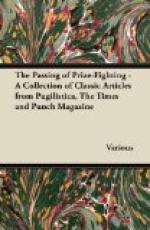Dear sir,—I look for your sympathy when I say that I regard the abolition of compulsory Greek at Oxford as tantamount to the collapse of the last bulwark of British Culture. It is idle for the advocates of this act of vandalism to protest that the spirit of Ancient Hellas can be adequately conveyed in the form of translations, and to illustrate this futile argument by reference to the authorised version of the Hebrew Scriptures. Admirable as that version may be, is it for a moment to be supposed that it can take the place of the original as a source of spiritual education? or that our appreciation of Holy Writ would not be a hundred-fold increased if it were fortified by a knowledge of the first principles of Hebraic syntax and by an elementary acquaintance with Hebraic composition. It is impossible to estimate the influence of such knowledge in tending to endear the Bible to our youth. To me indeed it has always been incomprehensible that our Prelates, who presumably have the welfare of the Church at heart, have never insisted on making Hebrew a compulsory subject for Responsions.
And now Greek has gone and Oxford is the home of one more lost cause. The gods (of the gallery) may be with the winners, but it is the losing side that still appeals to
Yours incorruptibly,
Cato.
* * * * *
“THE TIMES’ FLIGHT.”
DEAR MR. PUNCH,—His many friends (among whom I take leave to count myself) will heartily sympathise with Dr. CHALMERS MITCHELL on the engine troubles he has passed through, culminating in the enforced curtailment of his scientific expedition. It is gratifying to think that the pure and lofty spirit of research which animated the great newspaper-proprietor who sent him forth on this mission has been vindicated by the Doctor’s discovery of an unmapped volcano. Regrettably the conditions under which he observed it precluded him from making an expert survey of it, and even from securing specimens of its geological structure. The possibility of such an unfortunate contingency, which may have escaped the consideration of the promoter of the expedition, was recognised by other scientists. But it was confidently expected by his Zoological confreres that his voyage of exploration would add largely to our knowledge of the habits and customs of the fauna of Africa, and notably of the giraffe, as coming, by the exceptional development of its neck, within closest range of his vision as he flew through the vast inane.
Even better opportunities for the observation of animal life would, it was thought, occur during the occasional intervals spent on terra firma for purposes of repose or repair. And indeed one is greatly intrigued by the following terse and airmanlike entry in the log for February 20th: “Much disturbed by lions.” Nothing is said of the actual capture of one of these interesting denizens of the jungle, but reference to such a feat might well have been omitted out of regard for brevity. Is it too much to hope that the enterprise of The Times may yet be rewarded by the addition of a live lion to the Zoological Gardens?




